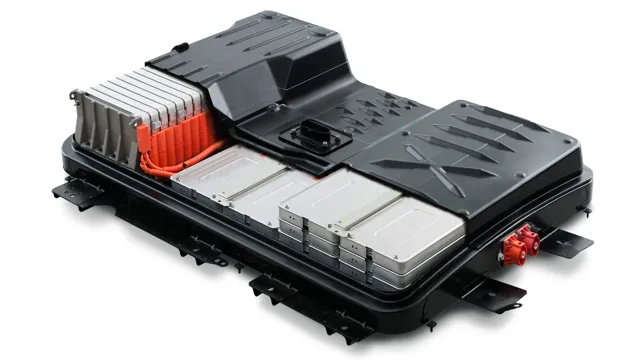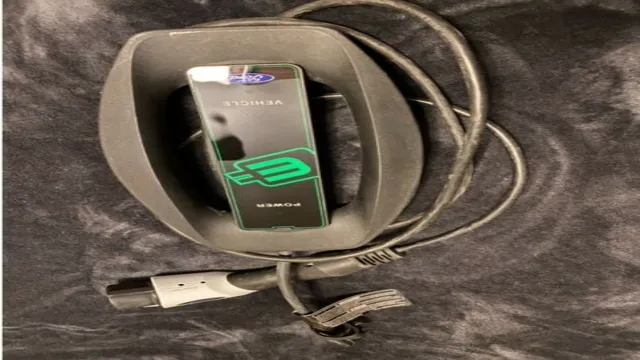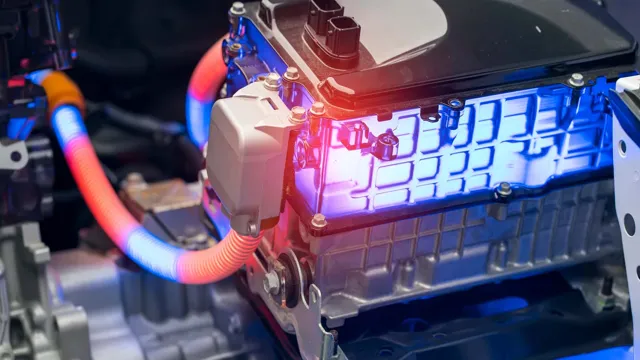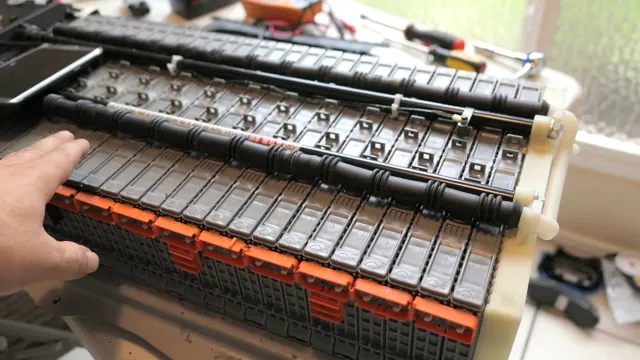Powering the Future: Why Lithium is the Key to Electric Car Batteries
Have you ever wondered what powers the electric car revolution? Lithium is the answer! Although this precious metal has been around for centuries, it is now becoming one of the most important elements to power our future. Lithium is an essential component in the batteries that power electric cars and other electronic devices. Without it, we would be struggling to move towards cleaner and more sustainable energy.
So, it’s time to give lithium the attention it deserves! In this blog post, we will take a closer look at lithium, its importance in powering electric cars, and its role in creating a cleaner and more sustainable future. So, buckle up, and let’s dive into this fascinating topic!
What’s Inside an EV Battery?
Electric car batteries are lithium-based, and their construction is rather complex. A typical electric car battery is made of several individual cells that work together to produce a high flow of energy. These cells are made of different components, including an anode, a cathode, a separator, and an electrolyte.
The anode and the cathode contain electrodes made of different types of lithium, which is where the battery gets its name. The separator is a thin layer that helps to keep the electrodes apart. The electrolyte is a liquid that helps to transfer ions between the anode and the cathode, producing an electric current.
Overall, the construction of an electric car battery is a sophisticated process that requires careful assembly to ensure optimal performance and longevity.
Lithium-ion Batteries Dominate EV Market
Lithium-ion batteries have become the go-to choice for electric vehicles (EVs) due to their high energy density and long cycle life. But have you ever wondered what’s inside these batteries? Lithium-ion batteries consist of three key components: the cathode, the anode, and the electrolyte. The cathode is typically made of a metal oxide, such as lithium cobalt oxide or lithium nickel manganese cobalt oxide, while the anode is usually composed of graphite or silicon.
The electrolyte, which acts as a separator between the cathode and the anode, is typically a liquid or gel-like substance containing lithium salts. These three components work together to store and release energy in an efficient and sustainable way. With advancements in battery technology, the future of EVs looks promising, as manufacturers focus on creating batteries that are smaller, faster, and longer-lasting than ever before.

Why Lithium is the Top Choice for EV Batteries
Lithium is the top choice for EV batteries due to its high energy density and ability to hold a charge for a longer duration. So, what’s inside an EV battery? The basic components include an anode, cathode, and electrolyte. The anode and cathode are typically made up of different metals that store and release energy as the battery charges and discharges.
The electrolyte is a solution that allows ions to move between the anode and cathode, facilitating electron flow and creating an electrical current. Within the electrolyte, lithium ions are used as the carriers of the charge, making lithium-ion batteries the most popular choice for EVs. These batteries are also safer than other types thanks to the use of non-flammable electrolytes.
Despite their high cost, lithium-ion batteries are the optimal choice for electric vehicles due to their efficiency, safety, and overall performance.
Advantages of Lithium Batteries in Electric Cars
One of the biggest advantages of electric car batteries being lithium is their ability to store more energy and provide longer driving ranges. This is especially useful for commuters or those who frequently travel long distances. Lithium batteries also have a longer lifespan compared to other types of batteries, which means less frequent replacements and cost savings in the long run.
Additionally, lithium batteries can be charged at a faster rate, allowing for quicker charging times and less time spent waiting for the battery to recharge. Another benefit of lithium batteries is their lightweight and compact size, which makes them ideal for use in electric vehicles where space and weight are crucial factors. Overall, the use of lithium batteries in electric cars provides a superior driving experience, cost savings, and greater sustainability compared to traditional fossil-fueled vehicles.
Lighter Weight for Greater Efficiency
Lithium batteries have become increasingly popular in electric cars due to their advantages over traditional lead-acid batteries. One of the biggest benefits is their lighter weight, allowing for greater efficiency and longer driving range. Lithium batteries weigh significantly less than lead-acid batteries, freeing up space in the car and improving overall performance.
Additionally, lithium batteries have a higher energy density, meaning they can store more energy in a smaller space. This allows electric cars to be more compact, lighter, and more energy-efficient, ultimately resulting in cost savings for the driver. As technology advances, lithium batteries continue to become more efficient and cost-effective, making them a desirable choice for electric car manufacturers and drivers alike.
Faster Charging and Longer Range
Lithium batteries are becoming increasingly popular in electric cars because of their numerous advantages, including faster charging times and longer range. Compared to traditional lead-acid batteries, lithium batteries are more efficient, allowing electric vehicles to charge in a shorter amount of time. Additionally, lithium batteries can hold more energy, giving electric cars a longer range before needing to recharge.
This makes them a great choice for commuters who need to traverse longer distances without worrying about running out of battery power. Lithium batteries are also lighter and more compact, making them easier to install in electric vehicles. With their improved energy density and greater efficiency, it’s no wonder that manufacturers are increasingly turning to lithium batteries for their electric car offerings.
Low Maintenance and Extended Lifespan
Lithium batteries are becoming increasingly popular in the automotive industry, particularly in electric cars. One of the main advantages of lithium batteries is their low maintenance requirements. Unlike traditional lead-acid batteries, lithium batteries don’t require regular topping up with distilled water, and they’re less prone to sulfation and corrosion.
Lithium batteries are also more durable and have an extended lifespan, which is great news for electric car owners who don’t want to have to replace their batteries every few years. The improved performance and durability of lithium batteries can also help to reduce the environmental impact of electric cars, as they require fewer resources to manufacture and produce less waste over their lifetime. So, if you’re looking for a low-maintenance and reliable power source for your electric car, lithium batteries could be the way to go.
Future of Lithium Batteries in EVs
Electric car batteries are lithium-based, and this technology has been steadily evolving over the years to become more efficient and cost-effective. As more and more people turn towards electric vehicles, lithium batteries are paving the way for the future of transportation. The developments in battery technology have allowed for longer driving ranges, faster charging times, and reduced costs for consumers.
Lithium batteries have proven to be reliable, durable, and sustainable, making them the ideal choice for electric cars. Additionally, advancements in recycling technology for lithium batteries promise to further reduce their environmental impact and increase their lifespan. Overall, lithium batteries are the driving force behind the future of electric cars, promising sustainable transportation solutions that are both efficient and affordable.
Improvements in Lithium Battery Technology
The future of lithium batteries in electric vehicles is promising. The advancements in lithium battery technology have contributed to an overall increase in battery efficiency, longer battery life, and faster charging times. One of the most significant improvements is the development of solid-state batteries, which uses a solid electrolyte rather than a liquid or gel electrolyte.
This innovation increases energy density and prevents fire hazards. Another promising area of research is the use of silicon-based anodes instead of graphite-based ones. Silicon can store more lithium ions, resulting in higher energy density and longer battery life.
The use of artificial intelligence and machine learning is also being explored in battery management systems to predict battery performance and allocate power efficiently. These improvements in lithium battery technology are crucial in making electric vehicles more practical and affordable for consumers, ultimately leading to a greener and more sustainable future.
Growing Demand for Electric Vehicles
With the increasing demand for electric vehicles, the future of lithium batteries in EVs looks brighter than ever. Lithium batteries have come a long way in the past decade, and they are now the most widely used power source for electric vehicles. These rechargeable batteries offer exceptional energy density, long-lasting performance, and fast charging times, making them an ideal choice for electric cars.
The demand for lithium batteries is expected to grow even further in the coming years as the automotive industry shifts towards electrification. With advancements in technology, lithium batteries are becoming more affordable and efficient, making electric vehicles more accessible to the masses. In short, the future of lithium batteries in EVs is promising, and it seems that these batteries will continue to be the go-to power source for electric vehicles in the years to come.
Conclusion: Lithium Powers EVs to a Greener Future
In conclusion, electric car batteries are lithium because in the world of energy storage, this metal reigns supreme. Like a mighty superhero, lithium possesses the power to pack a punch in its small size, allowing for lighter and more efficient batteries. Plus, with its impressive rechargeability and long-lasting capabilities, it’s no wonder that lithium has become the go-to choice for the electrification of the automotive industry.
So the next time you see a futuristic electric car silently cruising down the road, remember that it owes its power to the mighty lithium-ion battery.”
FAQs
What type of batteries are commonly used in electric cars?
Electric car batteries are commonly lithium-ion batteries.
Why are lithium-ion batteries preferred for electric cars?
Lithium-ion batteries are preferred for electric cars because they are lightweight, have high energy density, and can charge and discharge efficiently.
What is the lifespan of lithium-ion batteries used in electric cars?
The lifespan of lithium-ion batteries used in electric cars can vary, but they typically last around 8-10 years or 100,000+ miles.
Can lithium-ion batteries be recycled once they are no longer useful?
Yes, lithium-ion batteries can be recycled once they are no longer useful. Recycling helps reduce environmental waste and allows valuable materials to be reused in new batteries.





